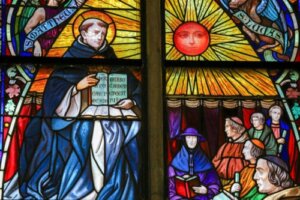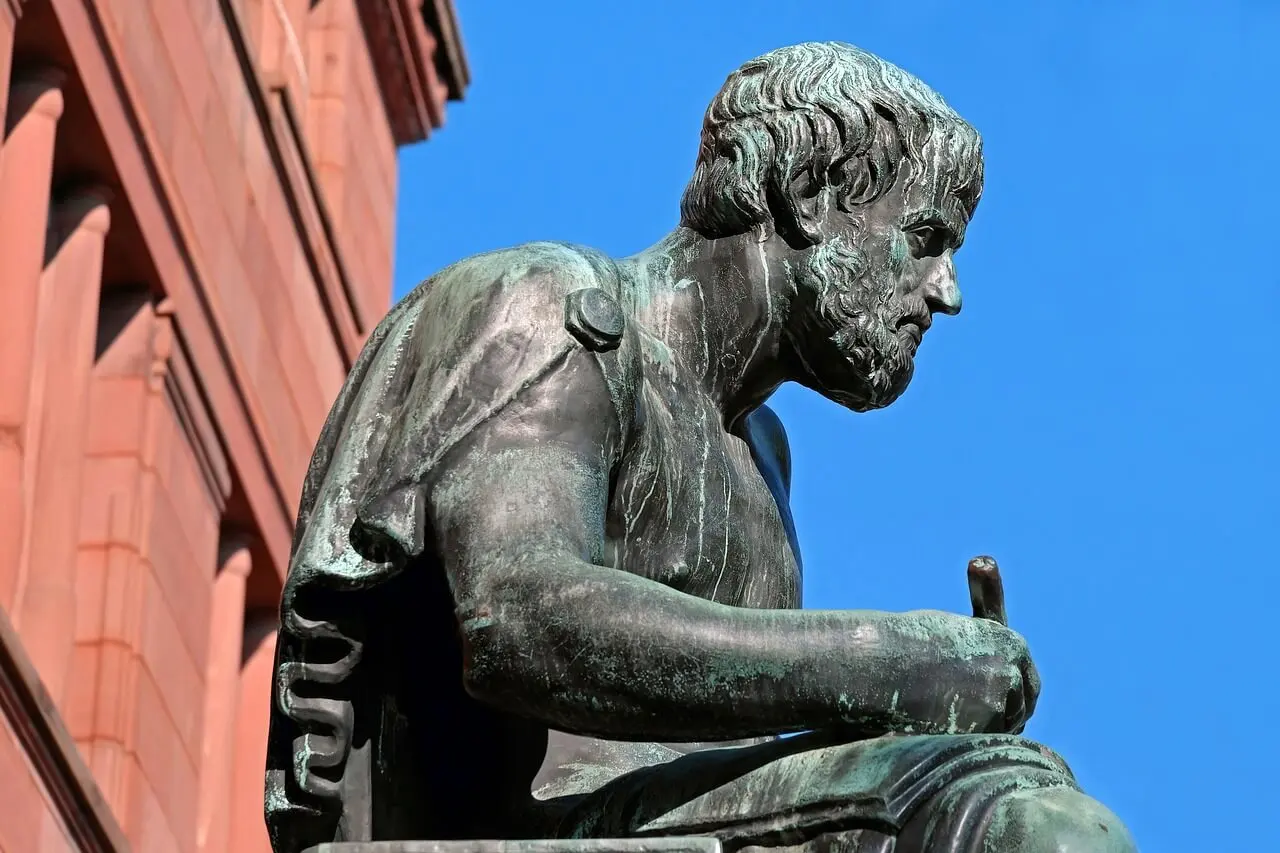St. Thomas Aquinas: Main Contributions and Thoughts


Written and verified by the philosopher Maria Alejandra Morgado Cusati
St. Thomas Aquinas (1225-1274) was a Catholic theologian and philosopher considered the main representative of the medieval scholastic tradition, which was a theological-philosophical current that defended the compatibility between reason and religious faith. Although he only lived forty-nine years, his written work is very extensive. It reflects a variety of themes, from metaphysical questions to political reflections.
The Catholic Church constantly reaffirms the importance of the work of this philosopher for understanding the teachings of Christian revelation. In fact, in 1957 he was named Doctor of the Church by the Church.
Next, we’ll take a closer look at who this great thinker was and his most relevant contributions.
A brief biography of St. Thomas Aquinas
St. Thomas Aquinas was born in 1224 or 1225 in Roccasecca, a castle located between Rome and the city of Naples. He was the son of Count Landolfo and Countess Teodora, both of whom belonged to the Italian nobility. Therefore, they expected Thomas to become an influential person.
At around the age of 5 or 6, he was sent to the abbey of Montecasino as an oblate, to begin his liberal arts education. There he began his apprenticeship in grammar, morals, music, and religion, until 1239 when Emperor Frederick II decreed the expulsion of the monks.
From there, the young man continued his studies at the University of Naples, where he came into contact with Aristotelian logic. In 1924, at the age of 19, he decided to join the newly created Order of Preachers or Dominicans.
This decision upset his family, who expected Thomas to succeed his uncle as abbot of Montecasino. Despite his family’s protests, he ended up becoming a Dominican monk.
In 1245 he attended the University of Paris, where he was trained in philosophy and theology by Albert the Great. In 1248 he was appointed professor and for 3 years he occupied one of the Dominican chairs in the Faculty of Theology.
For the next 10 years, he taught in various places in Italy until he was sent back to Paris to face the great opposition that had risen against his figure and doctrine.
After finishing his work in France, Thomas Aquinas returned to Naples. He died on March 7, 1274, on his way to the Council of Lyon, in the Cistercian abbey of Fossanova, due to a sudden illness.

The main contributions of St. Thomas Aquinas
St. Thomas Aquinas made substantial contributions in various fields, especially in metaphysics, ethics, and theology. Here are the most relevant ones.
Like this article? You may also like to read: Koshas or Sheaths of Being: What They Mean in Yoga and Philosophy
The compatibility between faith and reason
In the Middle Ages, the belief prevailed that faith and reason were two incompatible entities, so a relationship between the two was impossible. However, Thomas Aquinas refuted that conception so accepted by religious people.
In his work Summa contra gentiles he defends that both faith and reason are creations of God. Therefore, there can be a perfect relationship and harmony between the two.
For Aquinas, both the natural world and the supernatural world are works of God. Both cannot be considered separate or contradictory, since they proceed from the same creator.
In this sense, faith and reason, although they are two different things, do not contradict each other. Knowledge and truth can be obtained through both.
What is naturally innate in reason is so true that there is no possibility of thinking it false. Still, less is it licit to believe false what we possess by faith, since it has been confirmed by God. -Thomas Aquinas
Natural Laws on Ethics
Thomas Aquinas had one of the best-developed ethical systems. He addressed topics such as axiology, passions, virtue theory, normative ethics, applied ethics, law, and grace.
Among the most outstanding ethical contributions we find the distinction of four types of laws, which are defined by the author as “a prescription of reason, in order to the common good, promulgated by the one who has the care of the community”. He divided them into the following:
- Divine law: This is all the divine commandments that can only be known through revelation.
- Eternal law: This is provided by the order that God has established for the universe and that is irrefutable.
- Human laws are rules approved by the legal authorities so that “human audacity is moderated, innocence is protected in the midst of the wicked and is restrained in these”.
- Natural law: This is a set of basic moral principles rooted in human nature and knowable by reason.
We think you may be interested in reading this, too: The Philosophy of Nature and its Importance for the Modern World
Proof of the existence of God
Another of the major contributions of St. Thomas Aquinas is his logical proof of the existence of God, through what is known today as the FIVE WAYS. This proof starts from the analysis of the tangible and the lived experiences (the effects), in order to know the first cause (God).
His proof is so complete and systematic that it has since overshadowed those of Plato, Aristotle, Augustine of Hippo, or Anselm of Canterbury, becoming the model of classical philosophy on this point.
The Christianization of Aristotle’s work
St. Thomas Aquinas is also recognized as one of the pioneers in the introduction of Aristotle’s philosophy into scholasticism (a current that reconciles reason with faith). With this, he made philosophy and theology compatible, disciplines that for his time were considered contradictory.

Contributions to metaphysics
St. Thomas Aquinas also gave a twist to metaphysics, relying on the ideas that Aristotle addressed within this discipline. Aquinas believed that every being has in its composition an essence and an existence. In this case, he associated the essence – as a limitation – with the Aristotelian potency, and the existence – as perfection – with the act.
The independence of existence with respect to the essence lies in the question of the contingency of objects and of all metaphysics in general. In addition, he contributed to this discipline by deepening key concepts of it, such as being, existence, entity, relation, time, and space.
A Catholic philosopher who changed the paradigm
St. Thomas Aquinas was a scholar who marked a before and after in Catholic philosophy and theology, insofar as he reconciled two entities that until then were thought to be incompatible (faith and reason). Therefore, he’s considered one of the most influential figures of the Catholic Church.
All cited sources were thoroughly reviewed by our team to ensure their quality, reliability, currency, and validity. The bibliography of this article was considered reliable and of academic or scientific accuracy.
- Miró A. Las cinco vías y la “verdad fundamental” de la Metafísica tomista”. Hallazgos. 2022; 19(3): 1-64.
- McInerny R. Saint Thomas Aquinas [Internet]. California: Stanford Encyclopedia of Philosophy; 2014. Disponible en: https://plato.stanford.edu/entries/aquinas/#PerTho
This text is provided for informational purposes only and does not replace consultation with a professional. If in doubt, consult your specialist.








